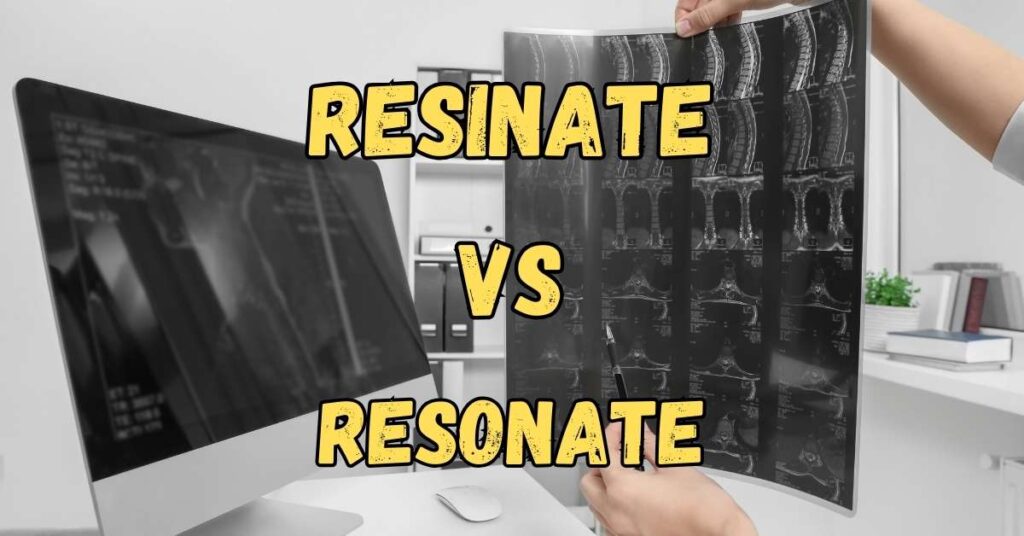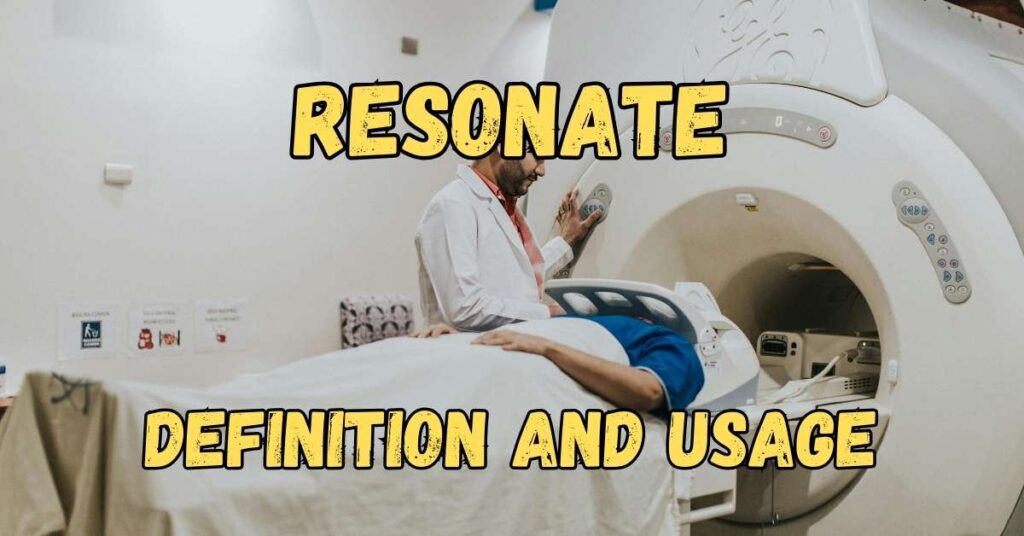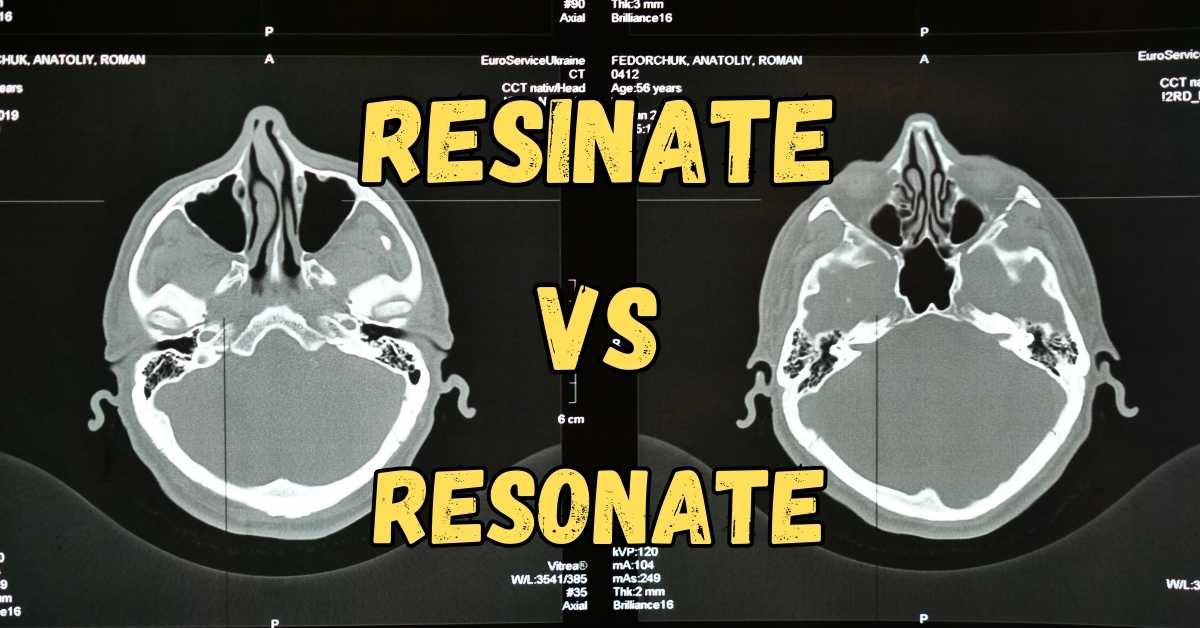When it comes to resinate vs resonate, many people find themselves confused. Although the two words sound alike, they have different meanings and uses. Understanding the correct word to use can help avoid misunderstanding and make your writing stronger.
Whether you’re writing an academic paper, a professional email, or just chatting with friends, knowing the difference between these two words will ensure you communicate more clearly.
In this article, we’ll dive deep into resinate or resonate, explain their meanings, and show you how to use them correctly. We’ll also touch on how natural language processing (NLP) can help understand language better. So, let’s get started and clear up this confusion!
Understanding Resinate vs Resonate

The words resinate and resonate are often mixed up, especially by people learning English. They sound similar, but they belong to different grammatical forms and have distinct meanings. To clear up the confusion, let’s break them down.
First, resonate is much more commonly used than resinate. When something resonates, it means it has a deep, lasting impact or echoes emotionally. For example, when you hear a song that brings back memories, you might say, “That song resonates with me.”
On the other hand, resinate is used more in technical fields like chemistry and music theory. This word refers to the process of coating something with resin, and you’ll usually see it in scientific contexts.
When you know the proper word, you can avoid making mistakes in your writing. Whether you’re writing an email, an essay, or a report, using the right word will make your writing clearer and more accurate.
Origins of the Resinate
The verb “resinate,” meaning “to impregnate with resin,” originated in 1756, combining “resin” with the verbal suffix “-ate.” The term derives from the Latin “resina,” which traces back to Greek “rhētinē,” referring to pine resin. This process is often used in winemaking to enhance flavor and seal containers
Origins of the Resonate
“Resonate” originates from the Latin “resonare,” meaning “to make a prolonged or echoing sound.” First used in English in the mid-1600s, it initially described sound. Over time, it gained a figurative sense, referring to ideas or emotions that resonate with individuals. Recently, it has been increasingly applied to describe alignment with political messages or concepts
Resinate: Definition and Usage

“Resinate” is a specialized term that refers to the process of treating or coating an object with resin. This term is primarily used in technical fields such as chemistry and music. In chemistry, resination can enhance the durability of materials, while in music, it may improve the sound quality of instruments.
Although not commonly used in everyday conversation, understanding the meaning and application of “resinate” is important for clear communication in relevant professional contexts.
Resinate Definition
To resinate means to treat something with resin, often for preservation or to enhance its properties. It is a very specialized term, used mostly in technical contexts.
For example, in chemistry, you might hear about substances being resinated to make them stronger or more durable. In music, resinate could refer to the process of treating strings or other parts of a musical instrument with resin to improve their sound.
Resinate Usage
Resinate is not a word you would often use in daily conversation. However, it’s important in fields like science, art, and technology. In chemistry, it may refer to the action of applying resin to objects. In music, it might describe a process that makes instruments sound better.
Synonyms of Resinate
Here are 10 words related to resinate that you might encounter:
- Coat
- Apply
- Treat
- Varnish
- Impregnate
- Seal
- Layer
- Enclose
- Preserve
- Cover
These words can describe the action of covering or treating something, like resinate does, but each has its own context and usage.
Resonate: Definition and Usage

“Resonate” is a versatile term that means to evoke a strong emotional or intellectual response. It can also describe sounds that echo or reverberate. This word is commonly used in various contexts, including literature, psychology, and everyday conversations.
When something resonates with you, it signifies a deep connection or impact, whether from an idea, story, or experience. Understanding how to use “resonate” effectively can enhance your communication and help convey your thoughts more powerfully.
Resonate Definition
Resonate means to have a deep emotional or intellectual impact. It can also refer to sounds that echo or reverberate. If something resonates with you, it means that it deeply affects you or has a strong connection to your thoughts or feelings. This word is often used when describing emotional or intellectual responses, whether to an idea, a piece of art, or a speech.
Resonate Usage
You’re most likely to use resonate in everyday speech or professional writing. It’s common in literature and psychology. For instance, after hearing a powerful story, you might say, “That really resonates with me.”
It’s also common in academic writing when discussing how ideas or theories echo in the minds of readers. In business, resonate is used to describe how messages or marketing materials impact consumers.
Synonyms of Resonate
Here are synonyms of resonate:
- Echo
- Reverberate
- Impact
- Affect
- Stir
- Move
- Touch
- Influence
- Inspire
- Connect
These words can describe the emotional or intellectual impact of something, much like resonate does.
Side by Side Comparison
Let’s compare resinate and resonate side by side:
| Word | Meaning | Usage | Example |
| Resinate | To treat with resin or coat something in a resin-based substance. | Used in technical fields like chemistry or music. | “The instrument was resinated to improve its sound.” |
| Resonate | To have an emotional or intellectual effect, or to echo. | Used in emotional, intellectual, or artistic contexts. | “Her story really resonated with me.” |
This table shows the key differences between these two words.
Everyday Usage Examples

Illustrate the correct usage of “resinate” and “resonate,” here are some practical examples. These sentences will help clarify how each word is applied in different contexts, making it easier to understand their distinct meanings. By seeing these examples in action, you can better grasp when to use each term appropriately in your own writing
Resinate Example
In a scientific context, you might hear:
- “The object was resinated to protect it from damage.”
This means the object was treated with resin to preserve or strengthen it.
Resonate Example
In an emotional context, you might say:
- “The movie resonated with me because it dealt with issues I care about.”
This means the movie made an emotional impact on you.
You May Also Like: Reenforce vs Reinforce: Simple Guide [2025]
FAQS: Resinate vs Resonate
Is resonate a feeling?
Yes, resonate often refers to a feeling or emotion. When something resonates with you, it means it has a personal, emotional effect.
What does resonate with mean?
To resonate with someone means to connect deeply with them, emotionally or intellectually.
Can I say I resonate with something?
Yes, you can say you resonate with something, such as a statement, experience, or idea, when it has a strong emotional or intellectual impact on you.
When something resonates with you?
When something resonates with you, it means it deeply affects your emotions or thoughts, often creating a lasting impression.
Conclusion
Distinction between resinate vs resonate is crucial for effective communication. While resinate refers to the technical process of treating something with resin, primarily used in fields like chemistry and music, resonate conveys a deeper emotional or intellectual impact in everyday language.
By using these terms correctly, you can enhance the clarity and accuracy of your writing. Whether in academic, professional, or casual contexts, knowing when to use resinate versus resonate will significantly improve your communication skills.
Related Article: Anual or Annual: What’s the Difference

